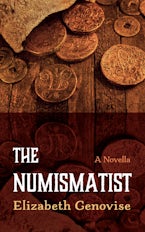In The Numismatist, a priest recalls a defining childhood summer during which his father's affair shattered his family. Befriended against his will by an elderly numismatist and a lonely neighborhood boy named Percy, the young James is forced to confront the realities of his parents' crumbling marriage, his fragile faith, and his own capacity for darkness. The temptation to project his resentment onto others slowly fades beneath the pressure of the love and inspiration he finds in his two neighbors, putting James on track to someday become a man of God.
Elizabeth Genovise earned her MFA at McNeese State University in Lake Charles, Louisiana. She is the author of five short story collections, the most recent being Palindrome (2022) and Lighthouse Dreams (2023). She works as an instructor of literature and creative writing.
“With these times of discontent, we need a vision in which the sacred and the quotidian mingle. In The Numismatist, Elizabeth Genovise fulfills that obligation with the story of James, whose life has fallen into desolation, and Matthew, the numismatist for whom coins reveal spiritual lessons; the search is for the Jesus coin, the rarest of all coins and proof that God works endlessly to bring us all back to him.”
—Daniel James Sundahl, author of Small Logics
“Elizabeth Genovise’s stories have amazing staying power—her imaginatively created scenes aren’t soon forgotten. In The Numismatist, we glimpse life through a ten-year-old boy’s eyes: hopeful and trusting, but also seething with anger at his father’s infidelity. Genovise sketches this young boy’s family and his dreams with incredible skill, and as she opens up his world, she illuminates our lives too. Very highly recommended.”
—John Thompson, Waynesburg University
“Elizabeth Genovise tells stories with an intimacy that strikes, lingers, and bewilders. The Numismatist takes the building blocks of daily pain and kindness and makes them resonate across years; she draws on the ephemerality of history in a way that reminds us how small our lives are, and how much each strangled moment of love means in the long arc of time.”
—Conor Sweetman, editor, Ekstasis











